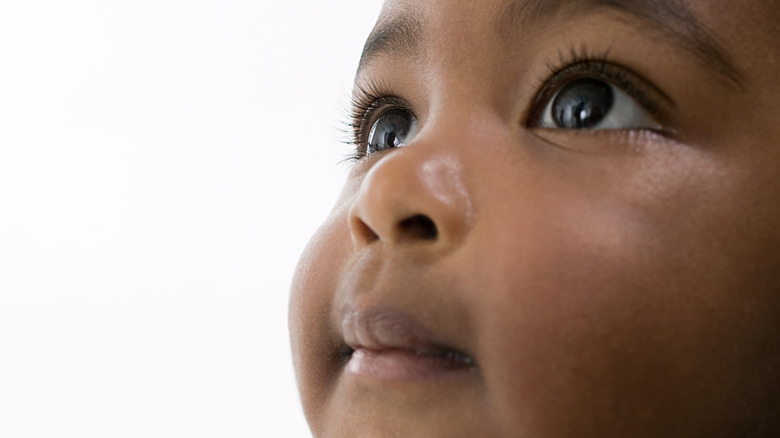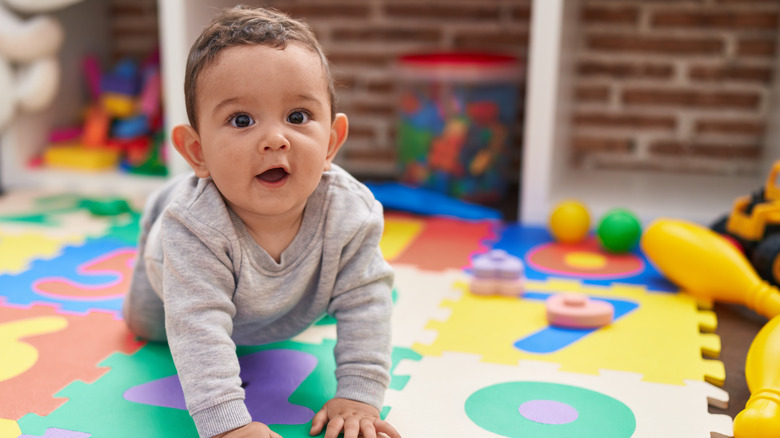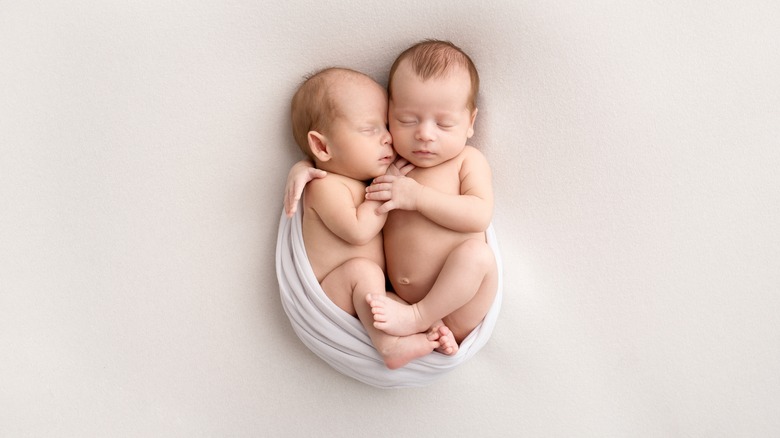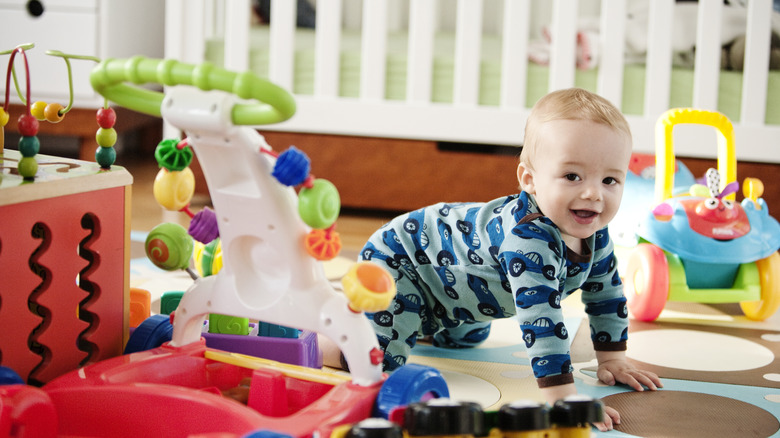14 Tips On Choosing The Best Baby Name, According To Baby Name Consultants
Choosing a name for your baby can be either the easiest decision you've ever made or the hardest. If your family has a set naming tradition (for instance, naming firstborn sons after their fathers), then you're covered. Ditto if you've always had your heart set on a favorite name and it happens to match your soon-to-be baby. But for many of us, the whole prospect of baby naming sounds like a branding exercise from hell. It's difficult enough for seasoned marketers to come up with memorable, effective brand names for products they know, understand, and have a targeted audience for — so how on earth are regular people supposed to come up with a defining name for someone they haven't even met yet?
Whatever it is must not only reflect well on the parents and their tastes and values, but also set the baby up for future success: Unless you're Elon Musk, you probably want to avoid a name that will stop people in their tracks in confusion or lead to teasing or ridicule. But you don't want to be too safe or boring, either. It's a pretty tall order — so we gathered a few professional baby name consultants to share their tips for breaking through decision paralysis to choose just the right name.
Honor your culture
For past generations of Americans, names were meant to be a way of fitting in — historically, parents chose from a handful of socially acceptable names for their children (there's a reason you know so many middle-aged guys named Dave.) And immigrants with conspicuously "different" names often felt compelled to shorten or anglicize them to avoid negative attention. Fortunately, this has changed — today's parents increasingly see baby naming as an opportunity to distinguish their child as a unique individual, and can choose from a previously unimagined range of options. While this is liberating, it can also make your decision a lot harder.
A good starting point for inspiration is close to home: your own cultural heritage. "Your cultural background is an integral part of your identity and origin," explained naming specialist Tatiana Dumitru, co-founder of the baby naming agency Marqess. She adds that much of the old stigma against foreign-sounding names has faded, and instead, they are increasingly celebrated as special and meaningful. "As societal appreciation for diverse cultures grows, incorporating cultural elements into your child's name adds a layer of significance and depth," she said.
Look to your family tree for inspiration
Many families and cultures have their own traditions around baby naming, for instance, naming children after parents or grandparents, or incorporating names of religious figures into their name choices. But even for those raised without such traditions, the names of relatives can still offer up promising and personally meaningful options. "Delving into your family tree to find a name that pays homage to a beloved family member is a heartfelt choice," Dumitru said. "It not only showcases respec, but also keeps the essence of that individual alive within your family's narrative."
But even the names of relatives you've never met — or previously heard of — can offer intriguing options. "If you have access to an extended list of your ancestors, there may be some hidden gems in there just waiting to resurface," advised naming consultant Sarah of Adored Names. And you can still mine your family's name list for inspiration even if none of the names quite hit the mark for you. For example, you can create an original name by combining parts of favorite relatives' names or choose a name that shares the same initials as a special family member.
Your values, passions, and history can also inspire your name choice
Most would-be parents are wise enough to understand that their children will eventually develop their own tastes, interests, and values, which may end up being quite different from their own. Still, parents want to help their children get their lives off to a good start by building a foundation based on what matters to them. Parents who are passionate about sports, music, or the outdoors, for instance, often can't wait to introduce their children to the activities they love and hope that their kids will eventually share their passion.
While there's no guarantee your baby will inherit your passion or your talent, they're still an important part of your family's identity and can be a great source of inspiration for baby names. "Think about what kind of name meanings resonate with you," Sarah suggested. "Maybe you love nature and want to focus on nature names. Now you have a starting point!" Dumitru agrees. "A name rooted in something you cherish adds layers of intention and authenticity," she said.
Be sure to check the meanings of names you like
Until recently, parents-to-be typically played it safe when it came to baby names, opting for crowd-approved favorites and avoiding unusual names for fear of setting their child up for ridicule. But now, all that has changed. "Today, the culture is more about standing out instead of fitting in, and the options are limitless," baby naming consultant Laura Wattenberg told NPR. "Everyone is pushing to be unique, to be creative."
And this means a lot of parents are actively considering names that previous generations would have found obscure or strange, or perhaps even making up their own names. While this opens up nearly infinite new possibilities for new parents, it also increases the risk of making a regrettable choice, especially if you fall in love with a new name solely because of how it sounds. "Crafting a name that holds profound meaning is akin to laying the foundation for a child's journey," Dumitru warns. "Beyond the aesthetics of the name, its connotations and associations shape their identity. Steer clear of names like Keres, which means 'evil spirits,' and instead, choose names that resonate with positive qualities you wish to imbue in your child."
Also look out for hidden associations names carry
When most future parents start thinking of baby names, they hope to land on a name that makes others think positively about their child — something that's pleasant to the ear and evokes warm feelings or positive attributes the child will embody. But, unfortunately, even common, well-liked names can evoke negative responses through no fault of their own. "Considering a name's historical or cultural associations is vital," Dumitru said.
For instance, names associated with polarizing public figures can be problematic and should be avoided. As an extreme example, Hannibal might sound like a retro, slightly transgressive choice for a boy's name, but should be avoided unless you want your son to face a lifetime of "The Silence of the Lambs" and "Hannibal the Cannibal" jokes. And even names with no public negativity attached to them can be problematic for personal or family reasons. For instance, baby name consultant Sherri Suzanne told NPR, some parents have a list of names that are automatically off the table. "What they're doing is they're saying, this [sic] are the names of my best friend's children, these are the names of my nieces and nephews. But a lot of times, they're saying, this is his ex-girlfriend," she explained.
Aim for a name that will age well
Of course you already know this, but naming a child is not like naming a pet. Pet names are magnitudes easier (and often more fun) to plan because there's far less riding on them. Your pet's future reputation and what others think of him or her is no one's problem but your own, and you can always just ignore the haters. (Your pet certainly will.) More crucially, your pet will always, in a way, be a child. Your tiny newborn kitten Toodles may eventually grow into full-size Maine Coon Toodles, but will still remain, at some level, your baby.
This is not the case, however, with a human baby. When thinking of baby names, it's natural to envision the little newborn who will soon be in your arms, and you might be tempted to focus on names that match a little bundle of cuteness. But babies grow into kids, then teens, and then adults faster than you think, and it's important that your child's name will also allow them to navigate the world credibly as an older kid and adult. So when thinking of names, don't just envision how they'll fit a baby. "See how you like the sound of it at later life events," naming consultant Abby Sandel of Appellation Mountain told The List. And remember, there are plenty of names with grown-up gravitas (e.g., Elizabeth) that also allow for adorable baby nicknames (e.g., Bitsy).
Be aware of potential nicknames
Yet another factor that makes choosing baby names so challenging is that names don't exist in a vacuum — whatever name you land on will be guaranteed to elicit varied reactions in others. And if you choose a longer or more grown-up-sounding name, a common response you'll get from friends, family, and acquaintances is a desire to use a nickname for your little one.
This a natural response and typically meant as a gesture of affection for the new baby, rather than disrespect. But if you love the name Mathilda but can't stand the nickname Mattie, the impulse to shrink down a perfectly nice name can be downright grating. You have two options for handling this problem. One is to nip it in the bud as soon as it starts — the moment friends and family come by to meet the little one and start using a nickname you hate, gently and firmly correct them. Repeat as often as needed (but be nice!). Another (less exhausting) option is to eliminate the problem further upstream: When choosing names, consider the nicknames associated with them. Are they names you (and your child) will feel comfortable hearing every day? If not, consider a safer name choice.
Ensure the baby's initials don't spell anything embarrassing
When choosing a baby's name, it's important to keep track of all the potential associations of the name, whether it's the name's historical or religious significance, its role in your family history, its popularity in your social circle, or just how easy (or difficult) it is for others to spell and pronounce. In short, you need to take into account all the varied ways a name can be used and perceived in the real world. Yes, it's a lot — and potential pitfalls can lurk in plain sight.
A case in point is the initials spelled out by your chosen name. "The initials, too, warrant attention to avoid unintended word combinations," Dumitru told The List. It might not seem like a big deal, but given that we use our initials for a number of practical purposes (identification at work or on school projects, not to mention monogrammed accessories), the last thing any parent should want is for their child to be socially sabotaged by an otherwise lovely name. So as much as you may adore the name Ashley Samantha Stevens, think long and hard before putting it on a birth certificate.
A great middle name makes a difference
While most of the stress of choosing a baby name tends to focus on first names, middle names matter too. "The middle name, often relegated to the background, deserves its own spotlight," Dumitru told The List. Don't think of the middle name as an extra decision-making burden, but an extra opportunity to add something meaningful to your child's name.
For example, if your choice for a first name doesn't reflect all aspects of your family's history and culture — and few names can — the middle name can be used to reflect an additional facet of your life. "Middle names are a great help," Suzanne told NPR. If you want a middle name from your culture, but don't want one that stands out too much or would be too difficult for others to pronounce, she recommends looking at potential English translations for that name. And once you've found a middle name you like, stand back and see how it looks and sounds when combined with the first and last name. "Vocalizing the entire name — first, middle, and last — can unveil any potential dissonance or lack of flow," Dumitru explained.
Avoid matchy-matchy names if you're expecting twins
If you're expecting twins, or a second or third child, it may be tempting to give the new baby a name similar in some ways to those of their siblings. And this can make sense — many families either give all their kids names that start with the same sound or give them names that rhyme or otherwise sound good when pronounced together . Having an internally consistent group of sibling names has another advantage as well: It prevents the risk of inadvertently making one child the odd one out by giving them a more distinctive name than the others.
But there's a difference between internally consistent names and nearly identical ones, and the latter can get you into trouble, as branding consultant Chrissy Bernal shared with The List. "I had a boy and a girl named picked out when I was pregnant. I chose Sierra as the girl's name. Then, a few weeks before I gave birth, I discovered I was having twins — identical girls. I had no idea what to name 'Baby B,' so I took the 'r' in Sierra's name and changed it to other letters until I came to Sienna," she recalled. "They're 24 now, and I can tell you that has been so confusing their entire lives. The pharmacy mixes them up. The government mixes them up. The doctor's office even mixed them up and deleted Sienna's entire record because they thought it was a duplicate."
If you have a unique name in mind, road-test it first
When reflecting on baby names, parents-to-be often worry about choosing an overly common name, fearing their child will end up lost in a vast crowd of Emilys or Olivias. But while some parents may secretly relish the idea of creating a new and completely original name for their child, they also worry that it might set their child up for ridicule. Of course, they want their child to stand out, but they want to be sure it'll be for the right reasons.
Fortunately, the parameters for socially acceptable names are wider than before, and few people bat an eye at the idea of offbeat baby names. "We live in an age of tremendous diversity in naming," Sandel explained. That being said, if you're concerned about how others will react to your name choice — or treat your child because of it — it's useful to envision how the name will be used in real-life situations. "A great thing to do when choosing a baby name is to think about how the name sounds in day-to-day life," Sarah said. "Imagine real-life scenarios, like calling the name out at a playground or hearing the name announced at a graduation. See how you like the sound of it in later life events. Sometimes this simple scenario test helps narrow down what names you truly feel fit your little one."
Partner hates your name choices? Here's how to end the impasse
Choosing your child's name is a deeply personal and subjective process, which means no two people will bring the exact same tastes, values, hopes, and/or concerns to their choices. And this means, unfortunately, that you and your partner may not always agree on your name choices. "So often one parent starts by listing some possible names while the other parent reacts," Sandel said. "If this leads to agreement on a favorite name or two, great! But it can be counterproductive, especially if one parent suggests and the other rejects again and again."
A way to get around this, Sandel said, is by finding common ground with your partner before seeking out names. "Talk about the qualities you'd like in a name first," she advised. These qualities can range from the style of name (vintage or classic) to the desired length of the name (say, a longer name to balance out a short surname). Above all, Sandel advises, keep an open mind. Explore names online and be open to surprises — a name you thought you'd hate may well end up being your name of choice. "It can be overwhelming, but if you're thinking about what's most important to you and your partner, the right options can leap off the screen," she said.
It's okay to get family involved – but you're in charge
Choosing your baby's name can be a daunting project because you're deciding, in large part, what the world's first impression of your child will be. And because your child's name is such a public part of their identity, you want to be sure you're getting it right. Therefore, you might be wondering if it would be a good idea to run your proposed names by friends and family.
While family and friends can be great sources of feedback and inspiration, it's important to know what you're getting into and set boundaries. Some family members, for instance, may try to compel you to choose a particular name or have an irrational hatred of a name you like. Thus, Sarah recommends against getting friends and family involved. "People feel like they can give unfiltered opinions on a name if the baby is not born yet. Often these opinions are more of a personal experience or preference like, 'I knew a coworker with that name, and I did not like them,' or 'That was my first dog's name,'" she said. "From what I have seen, opinions are much kinder and more filtered after the baby is born, so if you have already decided on the name, I recommend waiting until then to share."
Never forget why your baby's name matters
When trying to choose your child's name, it can be easy to get hung up on the small stuff, such as worrying about whether a given name is too popular or has fallen out of favor, or whether certain relatives will be offended if you don't choose their favorite name. But ultimately, what you're deciding on is how you want your child to be perceived by the rest of the world and the essential values and qualities you hope your child will embody. "Whether you opt for a name steeped in tradition or one that breaks boundaries, the goal is to craft a name that encapsulates the essence of your child's journey," Dumitru said.
To ensure your child's journey gets off to a good start, Sandel recommends reflecting on your own name and your positive and negative experiences with it. "Hated being one of three Jessicas in your graduating class? Don't name your baby Olivia. Loved sharing a name with your dad and grandfather? Maybe family names are the way to go," she said. Suzanne agrees, saying she recommends her clients do the same thing. "Those experiences with their own name are always very telling about the type of name or the type of experience they hope their own child has with their name," she told NPR.














